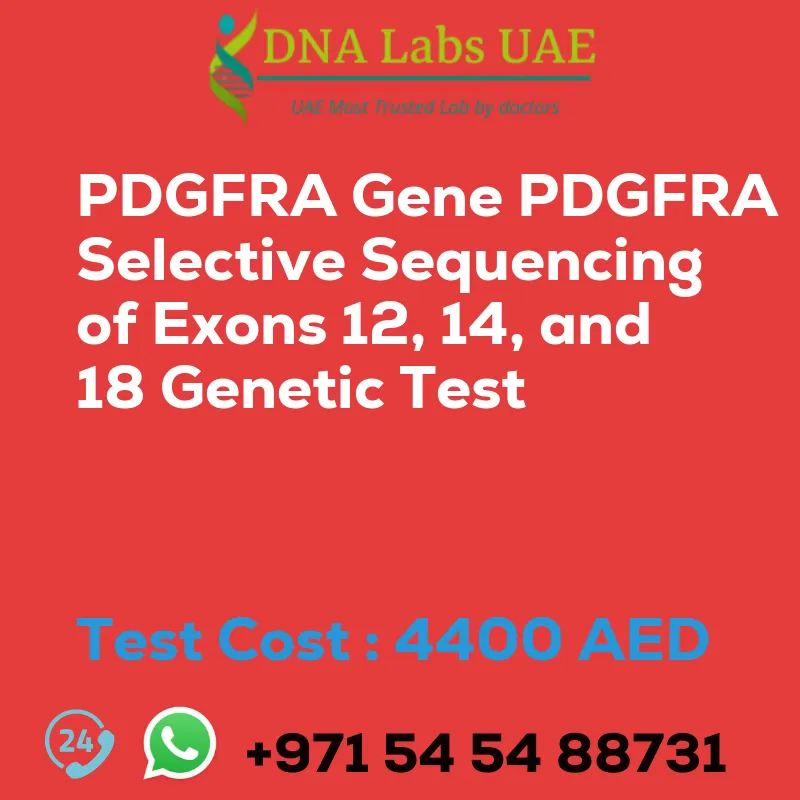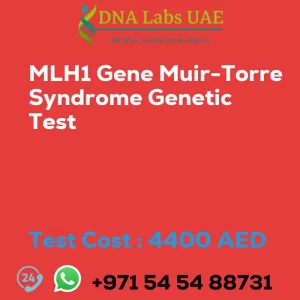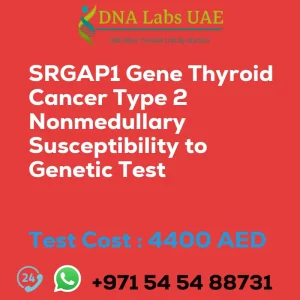PDGFRA Gene PDGFRA selective sequencing of exons 12 14 and 18 Genetic Test
Introduction
The PDGFRA gene encodes for the platelet-derived growth factor receptor alpha, which is a cell surface receptor involved in cell growth and division. Mutations in the PDGFRA gene have been associated with various diseases, including gastrointestinal stromal tumors (GISTs) and hypereosinophilic syndrome (HES).
Test Details
The PDGFRA selective sequencing of exons 12, 14, and 18 Genetic Test focuses on analyzing specific regions of the PDGFRA gene. Exons are the coding regions of a gene that contain the instructions for building proteins. By selectively sequencing these specific exons, the test can identify any genetic variations or mutations present in those regions.
The test uses Next-generation sequencing (NGS) technology, which allows for the simultaneous analysis of multiple genes or regions of the genome. In the context of PDGFRA, NGS is used to analyze exons 12, 14, and 18 to identify any genetic changes that may be relevant to the development or progression of diseases associated with PDGFRA mutations.
Benefits
This selective sequencing of exons 12, 14, and 18 using NGS can provide valuable information for diagnosing and managing patients with GISTs or HES. It can help identify specific mutations in the PDGFRA gene that may be driving the disease, allowing for personalized treatment approaches such as targeted therapies that specifically inhibit the mutated PDGFRA protein.
Test Components and Price
Test Name: PDGFRA Gene PDGFRA selective sequencing of exons 12 14 and 18 Genetic Test
Components: Exons 12, 14, and 18 selective sequencing
Price: 4400.0 AED
Sample Condition
The test can be performed using blood or extracted DNA. Alternatively, one drop of blood can be collected on an FTA Card.
Report Delivery
The test results will be delivered within 3 to 4 weeks.
Referring Doctor and Test Department
Doctor: Oncologist
Test Department: Genetics
Pre Test Information
Prior to the test, a Genetic Counselling session is recommended. This session will involve drawing a pedigree chart of family members affected with PDGFRA Gene PDGFRA selective sequencing of exons 12, 14, and 18 NGS Genetic DNA Test gene PDGFRA.
It is important to provide the clinical history of the patient who is undergoing the test.
Conclusion
The PDGFRA Gene PDGFRA selective sequencing of exons 12, 14, and 18 Genetic Test using NGS technology is a valuable tool for diagnosing and managing patients with GISTs or HES. It allows for the identification of specific mutations in the PDGFRA gene, leading to personalized treatment approaches and targeted therapies.
| Test Name | PDGFRA Gene PDGFRA selective sequencing of exons 12 14 and 18 Genetic Test |
|---|---|
| Components | |
| Price | 4400.0 AED |
| Sample Condition | Blood or Extracted DNA or One drop Blood on FTA Card |
| Report Delivery | 3 to 4 Weeks |
| Method | NGS Technology |
| Test type | Cancer |
| Doctor | Oncologist |
| Test Department: | Genetics |
| Pre Test Information | Clinical History of Patient who is going for PDGFRA Gene PDGFRA, selective sequencing of exons 12, 14 and 18 NGS Genetic DNA Test. A Genetic Counselling session to draw a pedigree chart of family members affected with PDGFRA Gene PDGFRA, selective sequencing of exons 12, 14 and 18 NGS Genetic DNA Test gene PDGFRA |
| Test Details |
The PDGFRA gene encodes for the platelet-derived growth factor receptor alpha, which is a cell surface receptor involved in cell growth and division. Mutations in the PDGFRA gene have been associated with various diseases, including gastrointestinal stromal tumors (GISTs) and hypereosinophilic syndrome (HES). Selective sequencing of exons 12, 14, and 18 of the PDGFRA gene refers to a genetic test that focuses on analyzing specific regions of the gene. Exons are the coding regions of a gene that contain the instructions for building proteins. By selectively sequencing these specific exons, the test can identify any genetic variations or mutations present in those regions. Next-generation sequencing (NGS) is a high-throughput sequencing technology that allows for the simultaneous analysis of multiple genes or regions of the genome. In the context of PDGFRA, NGS can be used to analyze exons 12, 14, and 18 to identify any genetic changes that may be relevant to the development or progression of diseases associated with PDGFRA mutations. This selective sequencing of exons 12, 14, and 18 using NGS can provide valuable information for diagnosing and managing patients with GISTs or HES. It can help identify specific mutations in the PDGFRA gene that may be driving the disease, allowing for personalized treatment approaches such as targeted therapies that specifically inhibit the mutated PDGFRA protein. |








